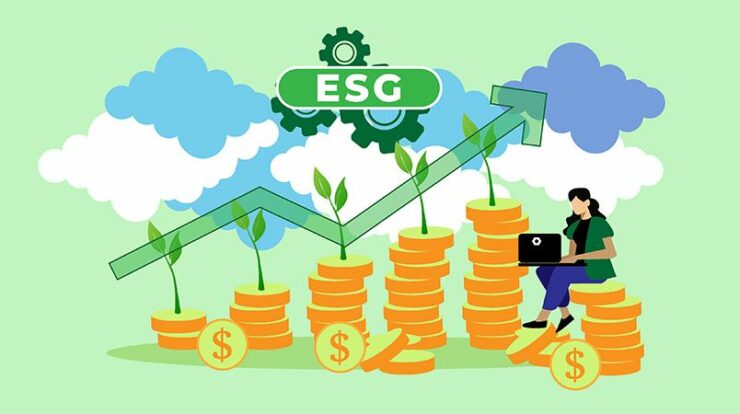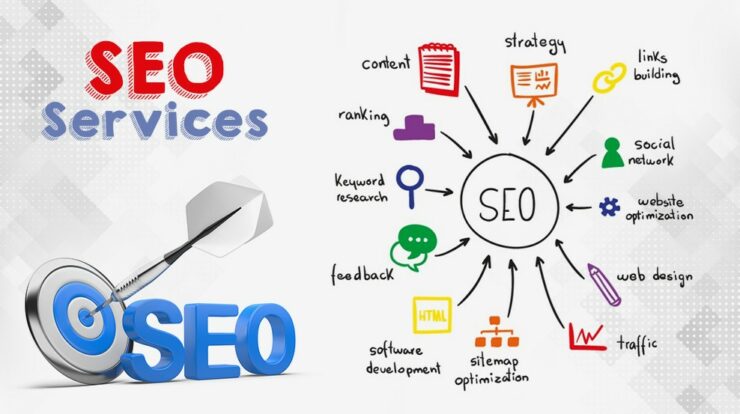
Environmental, social, and governance (ESG) investing is a way to put your money to work with companies that try to make the world a better place. ESG investing is based on independent reviews that help you figure out how a company acts and what policies it has when it comes to the environment, society, and government.
The word “ESG” was created in 2005 in a study called “Who Cares Wins.” Now, the world’s overall ESG assets are expected to be worth more than $41 trillion by 2022 and $50 trillion by 2025. A study by Bloomberg Intelligence says that this is “one-third of the projected total assets under management globally.”
In a short amount of time, ESG investment has become more and more popular. It’s no longer just a fad but a common way to spend.
What is ESG investing?
ESG investing, also called “socially responsible investing,” “impact investing,” and “sustainable investing,” is an approach to investing that focuses on the best environmental, social, and governance (ESG) factors or results. Most people think of ESG investing as a way to invest “sustainably,” which means that investments are made with both the economy and the environment and people’s well-being in mind. It is based on the growing idea that environmental and social factors have a rising effect on how well a group does financially.
There’s nothing new about the ideas behind ESG investment. Investing choices were affected by religion and moral views hundreds of years ago. Muslims made purchases that were in line with Sharia law, which says that guns are not allowed. Quakers and Methodists came up with the first ethical unit trusts in the US and UK. Today, investors are more aware of how to act ethically in the market because corporate social responsibility (CSR) and social sustainability are becoming more popular. With the release of the Principles for Responsible Investments (PRI) in 2006, which is a set of rules from the United Nations for incorporating ESG factors into company policy and strategy, ESG investing may have truly become a part of mainstream investing. The PRI has more than 2,000 members, and most people think of it as the official source for all things related to ESG investment.
How does investing in ESG work?
The ESG approach is to invest in companies that get high marks from third-party, independent companies and study groups on scales of environmental and social responsibility.
Hank Smith, Head of Investment Strategy at The Haverford Trust Company, says that ESG investment is all about making good changes in society by being a better investor.
Smith says that ESG investing is based on the idea that there are some environmental, social, and business governance issues that affect how well a company does generally. When buyers think about ESG factors, they get a more complete picture of the companies they invest in, which can help them reduce risk and find opportunities.
Here is a better look at the three ways companies are judged for ESG investing:
- Environment. What kind of effect does a business have on the environment? This can include a company’s carbon footprint, the harmful chemicals it uses in its production, and its attempts to make its supply chain more environmentally friendly.
- Social. How does the company improve its social impact, both inside the company and in the community as a whole? Social factors include things like freedom for LGBTQ+ people, having people of different races in the executive room and on the staff as a whole, and having inclusion programs and hiring practices. It even looks at how a company promotes social good outside of its business, in the bigger world.
- Governance. How do the board and management of the company bring about good change? Governance includes everything from how much executives are paid to how different the people in charge are and how well they listen to and talk to owners.
Many people think that ESG investing is about more than just a three-letter acronym. It’s also about how a company treats its workers, neighborhoods, customers, stockholders, and the environment.
Mike Walters, CEO of USA Financial, says that a good ESG investment should be judged by how it affects these five groups, both positively and negatively. “This is important because it affects each stakeholder, but it can also be used to figure out how strong and stable the company is as a whole.”
Walters says that companies that work hard to make sure that each of their five clients gets what they want to end up being well-run companies. And stocks of well-run companies tend to be good investments.
Why investing in ESG is so important
Elizabeth Lewis, managing director and deputy’s head of ESG at Blackstone, spoke at Sphera’s virtual ESG Summit in June 2022 about the benefits of taking ESG factors into account when making investments. Lewis says that putting ESG factors into the investment process lowers risk and makes investments more valuable for both buyers and businesses.
ESG success is becoming more important to regulators, and investors are increasingly choosing to put their money into businesses that share their values and goals. A PwC study of 325 investors found that 79% said “ESG risks are an important factor in making investment decisions” and 49% said they are “willing to divest from companies that aren’t taking enough action on ESG issues.” Also, 75% of those who answered thought it was worth “giving up short-term profits to deal with ESG issues.”
With the Intergovernmental Panel on Climate Change (IPCC) saying that we need to keep global warming below 1.5 degrees Celsius (2.7 degrees Fahrenheit) to avoid the worst effects of climate change, it’s clear that now is the time to invest in companies that are preparing for a net-zero, low-carbon future. Investors want to know that the companies they back are taking climate change seriously and doing what they can to protect the earth. According to the PwC study, 65% of investors said that lowering Scope 1 and 2 greenhouse gas (GHG) pollution was one of the most important ESG problems for businesses to focus on. 34 percent said that reducing Scope 3 pollution was their top concern.
The Royal Bank of Canada (RBC) says that people used to think that ESG investments led to a lower return on investment. But the RBC said that in the past few years, ESG stocks have become a better long-term investment.
How do ESG scores get figured out?
ESG research companies give marks to a wide range of businesses. This gives investors a clear and useful way to compare investments.
Linda Zhang, Senior Advisor at SoFi and CEO of Purview Investments, says, “ESG scores are ratings that research firms give to each company.” “Rating firms usually use more than one criterion to judge each of the E, S, and G components.”
Some of the best ESG study companies are Bloomberg, S&P Dow Jones Indices, JUST Capital, MSCI, and Refinitiv. Scores are usually in a range from 0 to 100. The higher the score, the better a company does at meeting ESG standards. Scores may be different between companies because they may use different measures and weighting methods.
ESG rating companies look at things like annual reports, corporate sustainability measures, resource/employee/financial management, board structure and compensation, and even controversial weapons screenings. The exact things they look at depend on the company.
How can I find ESG investments?
If you’re ready to put your money to work in an ESG plan, you can do your own study, use robo-advisors, or talk to a financial advisor to find investments that meet your needs.
Do your own research on ESG. Each year, “best of” lists are made of the top ESG-rated stocks, which buyers can use to find individual stocks. You can use these lists to find possible investments that might help you reach your goals. Then, you can build a diversified portfolio with an asset allocation plan that fits your investment timeline.
You don’t just have to look for ESG stocks, though. You can also choose funds, just like you can with other types of spending. You don’t have to worry about picking individual companies. Instead, you can let a fund manager or an index do it for you. Online research may also be a little bit easier for ESG ETFs and mutual funds.
You can use screening tools like Morningstar’s and the term “ESG” to find highly rated ESG funds and ETFs from a range of brokerages and fund families.
Walters of USA Financial says, “For more specific information, As You Sow is a great resource that breaks down exposure to companies involved in things like fossil fuels and deforestation in ESG and non-ESG funds.”
Walters says that buyers of ESG funds should pay attention to the cost rates. “ESG characteristics are important, but traditional metrics like cost are also important,” he says. “ESG funds’ expense ratios have gone down over the years, but they are still, on average, higher than those of other funds.”
This means that you might have to pay a little more for funds that are based on ESG factors. You might not mind paying a small fee to invest in your values, but it’s still important to remember. Higher costs that don’t come with at least a little bit better performance may lower your long-term returns.
ESG-Savvy Robo-advisors
Robotic advisors that offer ESG-conscious strategies could be a good place to start for buyers who want to combine doing things on their own with some help.
Different robo-advisors may have different rules about what makes an investment ESG, but Betterment, Ellevest, Wealthsimple, Sustainfolio, Earthfolio, and OpenInvest are known to work with ESG in mind.
With a robo-advisor, the fees may be higher than if you did it yourself, and you may end up in a lot of ETFs that you could have invested in on your own, but you’ll get expert-level study and automated handling of your investments.
ESG Financial Advisors
Help with ESG trading techniques is one of the many good reasons to work with a financial expert. Another thing is that financial planners try to get a big-picture view of your whole financial life, including details that robo-advisors might miss, like your personal values, which could be used to make an ESG strategy fit your viewpoint.
If you already have a financial advisor, they should be able to help you choose investments with high ESG scores that are in line with your investment goals. If you’re looking for a financial adviser, ask the candidates what ESG choices they’ve suggested to their clients in the past.
Even though the costs are higher than self-directed study or robo-advisors, you get a full-service relationship and a trusted partner to help you make investments that help the world.
ESG investing in the future
The RBC says that when owners choose ESG investments, their portfolios are ready for the changes that need to happen to make the global economy more sustainable, like hitting net zero emissions by 2050.
Research from The Economist Intelligence Unit and RBC Wealth Management shows that younger generations care more about how businesses do in terms of environmental, social, and governance (ESG) issues than older generations. As a result, ESG factors are becoming more important to younger buyers when they choose companies to invest in.
As the climate changes, we must also change how we live. One way to do this is to choose to invest in companies that care about ESG. After all, we all gain when we put money into making the world safer, more sustainable, and more efficient.




